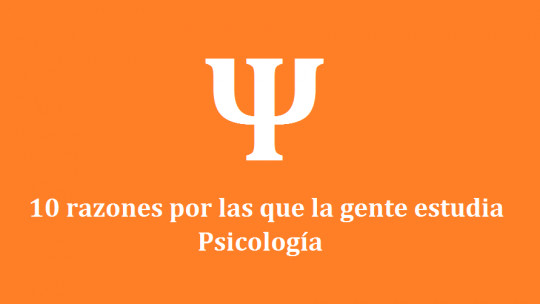“Is a Psychology degree difficult?” It is a question that every student has asked before beginning to study the science of behavior. We have all felt the need to ask ourselves if, perhaps, that interesting career that was presented to us as a possibility within reach, could at some point overwhelm us due to its difficulty and demand.
If you are a person who is finishing your high school studies and your goal is to study Psychology, there is no doubt that this article interests you. If your case is a little less orthodox and you are thinking about going back to study but you are not sure if studying Psychology could be a good idea, you should also continue reading.
The perception of difficulty regarding the Psychology career
In this post I have dedicated myself to asking a total of eight mental health professionals about their honest opinion about the question at hand : Is the Psychology degree easy or difficult? As this is a question whose answer is highly subjective, I found it interesting to collect the answers from professionals with different profiles and characteristics: age, nationality, specialization… among all of them, I hope, you will be able to draw your own conclusions.
1. Miguel Ángel Rizaldos

Answer : I recently turned thirty years since I started studying at the Faculty of Psychology at the Complutense University of Madrid. That’s why we were at an event for the 25th anniversary of my promotion. I remembered with my classmates at that event when I returned to the hallways and classrooms of the faculty some experiences from those old days, when we were young, excited people and a little lost in life.
For those of you who are thinking about studying psychology, I tell you that you now have a very consolidated and recognized profession. What was most difficult for me at that time was statistics and a subject called ‘Thought and Language’. But nothing that cannot be overcome with will and effort. Then, in the exercise of the profession, comes what is truly exciting: working with people so that they achieve greater well-being.
2. Teresa Vallejo Laso

Answer : Nothing is difficult if you put your mind to it. The first step in the process of becoming a psychologist is the interaction of ability, motivation, and effort. For any objective you want to achieve, whatever its nature, the first thing you have to have is the capacity, that is, meet the conditions, qualities and aptitudes, which in this case would be intellectual. Just as important as ability is motivation or will, which is what fills you with energy and guides you towards achieving the goal you set out to achieve. But this is not enough, since effort is also necessary to carry out the action. And the interaction of these three variables is so important that without each other, they could not act separately in this process and it would not have been possible.
But you will also have to overcome other difficulties. The first year will disorient you a little, since that is where the idea and erroneous beliefs of what until now you understood psychology to be are dismantled, ideas that are based on myths and popular knowledge that have so shaken and damaged this profession. It has happened to all of us that what we had been told is psychology and what we imagined, or had seen on TV, is not it (knowing if people lie by looking at them or through the polygraph, guessing what they think, psychoanalyzing them). on a couch…). Another barrier you have to overcome are the early years subjects. Arriving at the degree and finding yourself with subjects such as psychometrics (statistics, probability, data analysis), psychophysiology, biology, anthropology, research design, seems not to coincide with what you expected and discouragement may appear.
But do not despair: psychology is a science and, as such, it uses the scientific method and research to build theories and models that allow you to explain, predict and control behavior and mental processes and for that you will have to study a lot. If you manage to overcome these traps, everything becomes easier and what you were waiting for begins to arrive, being able to choose a specialty. In my case, the clinic, subjects such as Psychopathology, Behavior Modification, Psychodiagnosis, etc. But there are so many and varied branches around the understanding of human behavior that make psychology never cease to surprise, interest and fascinate you. For all this, if you have come this far, if you have understood what this science is, if you are passionate about reading and discovering in order to provide tools that help improve people’s lives, you feel the need to do so, you have the ability to empathize with people, you know how to listen, manage, solve problems and you have the ability to draw conclusions, you are on the right path to start discovering this exciting world that is psychology, and I encourage you to do so.
3. Isidro Migallón

Answer : I consider that the Psychology degree has a medium/high difficulty, especially if you study it at the UNED as is my case. On the one hand there are very accessible and easy to understand subjects such as Social Psychology or Developmental Psychology and, on the other hand, there are more complex and in-depth subjects such as Psychopharmacology or Language Psychology.
Approximately 20% of the degree is made up of “numbers” subjects that tend to give students the biggest headaches (especially if you have studied a bachelor’s degree in literature) but are completely ‘passable’ with a little determination and effort. Among these subjects are Data Analysis (I and II) and Psychometrics.
There are also some subjects that we could define as more “medical” and related to the human body and health. Examples of these subjects can be found in “Developmental Neuropsychology”, “Fundamentals of Psychobiology” and “Physiological Psychology”. Although the degree of depth of these subjects is quite high, in my opinion they are the most beautiful and interesting of the degree. In short, I think it is a race with a medium/high difficulty that will go from one pole to another depending on the tastes and interests of each person.
4. Marc Lluís Vives

Answer : Studying a degree in Psychology under my experience at the University of Barcelona is not difficult, in the sense that it meets a maxim that other degrees considered more complicated sometimes do not meet: if you study, you almost always pass. With a better or worse grade, but the usual thing is to pass after having studied. And studying does not mean putting in the day before, but rather constant and lasting work. I’m not saying that it’s not necessary to put in the effort and put in the hours, it is, but that effort almost always pays off. In any case, we must separate what it means to “get” the degree from actually reaching an appropriate level of master’s degree in relation to the field that one wants to dedicate to psychology, whether clinical, research, social or human resources. In this sense, years and years of dedication and learning are necessary to be able to say that one masters their field of work.
Getting to really know a field requires a lot of personal effort, and constant self-learning during and, above all, after the degree. In my case, the little I know about psychology is not thanks to formal institutionalized education, but to my hours of dedication reading and studying the field that I am passionate about on my own. Learning, in the end, is an individual job.
5. Jonathan García-Allen

Answer : The difficulty of the race depends on many factors and stating that it is easy or not has much to do with the motivation and desire of each person. The time you have to dedicate to your degree is also important: there are people who have all the time in the world to study and others who combine study with work, so it may be more difficult for them to keep up with their subjects. The race is long, and no one is going to give it to you if you don’t make an effort. You should also keep in mind that four or five years can seem like an eternity if you don’t enjoy what you’re doing. And of course, the career requires effort and persistence, since you have to read many books, scientific research and articles to be able to understand the complexity of the human mind, behavior and interpersonal relationships.
The first years are the most complicated (and can even be boring) because the subjects prepare you to have a good foundation. As your degree progresses, you specialize in what you like and put into practice the knowledge you have acquired over the years. In my case, the degree was affordable because I had previous training in both biology and statistics, subjects that, despite not being complicated, are usually not liked by many students. Now, if you really want to be a psychologist, with desire and determination the results will come.
6. Karemi Rodríguez Batista
- Karemi Rodríguez Batista, Health psychologist, and expert in clinical and adult psychotherapy. Founder of Psico-K
- Age: 37
- Lives in: Madrid, Spain
- University where he/she studied: National University of Distance Education
- Specialty: Clinical and Health Psychology

Answer : It’s a question that requires an answer based on your personal situation, of course, but if you’re reading Psychology and Mind, and specifically this entry, you surely start with elements in your favor, that you like psychology and that you are motivated, and these are the two most important factors for success in your studies and that you should enhance. Now, I think that you have to take into account other factors before starting this beautiful adventure, simply to be able to control them in the best possible way, such as: the study modality that you consider (in person or remotely, perhaps you think that It will be easier at a distance, but believe me it has its degree of difficulty, you will have to be more autonomous and find your way to complete this training, in a face-to-face it is a little more guided but both have their pros and cons), your current age ( It is not the same to arrive at 18 as at 48, because you will have more responsibilities and perhaps feel less agile, however strategies such as organization and promoting study, sleep and eating methods are usually a very effective method) your responsibilities, your habits of study (which can always be improved regardless of age)…
Anyway, these are just some factors, only you can detect what those strengths and weaknesses are, but I am sure that with a lot of effort, and above all, patience with yourself you can solve any difficulty and become a great mental health professional. Cheer up!
7. Jonathan Suarez
- Jonatan Suárez, psychologist and professor at the Technological University of Guayaquil
- Age: 29
- Lives in: Guayaquil
- University where he/she studied: University of Guayaquil
- Specialty: Teaching

Answer : Studying psychology goes beyond spending four or five years in a classroom studying a range of books that tell us about human development and behavior. A very important factor that comes apart and determines whether you have the aptitude or attitude to study this career is the vocation. When a person is asked about the reasons why they would like to study this career, the most common response can range from “they want to help people solve their conflicts or problems” or another profile that tells us that “ “The human mind seems interesting to him and studying it is quite a challenge.” Pursuing a degree in psychology opens us to a varied field of topics and knowledge. It is a time of dedication to scientific reading and research, which will provide us with the theoretical knowledge necessary to be able to practice as psychologists in practical and real matters.
As for the level of demand for the degree, it will depend a lot on the university and its academic offer. In the most cutting-edge universities you will find subjects approved by a scientific council that evaluates the course framework and approves the subjects essential for the student’s development. This indicates that you will have to give an excellent performance to be able to pass the cycles, obviously if you put effort and dedication you will be closer to achieving it. With this I do not mean that other universities do not try to make the most of the talent of each student, but there are often cases of academies that do not provide the necessary guarantees for adequate development for their students and tend to graduate professionals with frankly limited knowledge. The evaluation process, likewise, usually presents some deficiencies. In short, any academic career, no matter how “easy” it appears to be, is an investment not only of money, but also of time and effort and will require many hours of dedication. If you decide to study psychology, the best thing is that you feel that it is your vocation.
8. Anissa Ouali Lamtalbi
- Anissa Ouali Lamtalbi, integrative psychotherapist and clinical sexologist
- Age: 30 years
- Lives in: Calella
- University where he/she studied: University of Barcelona
- Specialty: Psychotherapy and sexology

Answer : In general terms, the psychology career itself hides the same difficulties as many other careers, for example, feeling lost (at the beginning, but also at the end), very stressful exam periods, endless hours of study, cursed subjects, books that look like bricks…. And of course, the great demotivation that accompanies us: after all this effort, where you will really learn will be after the race! (so why study so much?). Faced with these difficulties, we will need various ingredients that can help us, since in their absence they can make the slope steeper and create greater difficulty. The difficulty does not lie solely in whether or not there is motivation and desire (but they will be necessary), nor in one’s own ability (although it helps). For me the difficulty lies in the vision you have of the great project. One way that helps me understand this is to visualize it as a journey. Knowing the place you would like to reach helps us plan the route and mark the steps to follow. This may be, in my opinion, the greatest difficulty. When you have already decided, you know that you want to be a psychologist (although you really do not know the range of work areas that a psychologist can have), you will have to start asking yourself other questions, for example, What do you want to be when you grow up? Where would you like to see yourself working? As you do? What specialty will you choose?…
These and/or many other questions are what usually arise after the race (unless our objectives have been very clear and immutable from the beginning) and that is where vertigo can arise and feel more lost. Therefore, it is important to consider, little by little (there is no need to wait to finish the race) where we want to go, and with the help of our motivation, desire, sacrifices, searching for resources,… we will be able to reach our destination!









